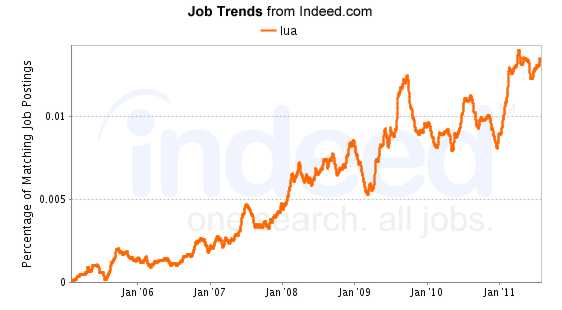| Lua, D and the Cs all gain ground |
| Written by Mike James | |||
| Sunday, 18 September 2011 | |||
|
Could the fastest growing languages be D and Lua? According to the TIOBE index they are, and there is some other evidence to back this up. The TIOBE index of programming languages is not the easiest thing in the world to interpret, and you should never try to read anything much into the fine details, but it does show a broad indication of what is going on. This month there have been some interesting movements.
The biggest change is that Lua is not only in the top 20 languages, but is already at number 13. It made it to number 10 recently but many dismissed this as a random glitch mainly because it beat JavaScript - the idea that more people use Lua than JavaScript is difficult to believe. Some are even of the opinion that Lua's rapid rise is more an indication of the problems with the TIOBE index than a real indication that the language has grown in popularity. However, the number of job postings mentioning Lua does seem to be on the increase:
Job Trends from Indeed.com
All of this is enough to suggest that there is something going on with Lua even if it probably doesn't deserve quite the ranking it gets on TIOBE. In case you have missed it Lua, which means moon in Portuguese, is a scripting language that borrows from Scheme, Modula and a few other languages. It is mostly associated with game creation, although this is probably an unfair characterization. In 2010 Apple allowed the use of Lua to create iOS applications - a move which probably started the growth in interest in the language. The other big gain is for the language D, i.e. D the one after C. D is not a new language but it has had the benefit of a new book, see side panel. It has been in the top 20 before and now it is back in at number 20. It probably has seen a real boost in use recently due to the release of a new version. Who knows if it really is popular due to the difficulty of doing searches on its name, which matches just about anything with a "d" in it! Other gains are for C# at number 4 and Objective C at number 6 - both of which are probably benefiting from mobile use. The main loser is F#, which did make it into the top 20 for the first time last month, much to the delight of the F# community. However, its demotion doesn't seem to be justified based on the trend in the number of F# jobs on offer which is still growing.
Don't take the TIOBE index too seriously - and as everyone knows, the best programming language in the world is Fortran. More Information
To be informed about new articles on I Programmer, subscribe to the RSS feed, follow us on Twitter or Facebook or sign up for our weekly newsletter.
|
|||
| Last Updated ( Monday, 19 September 2011 ) |



